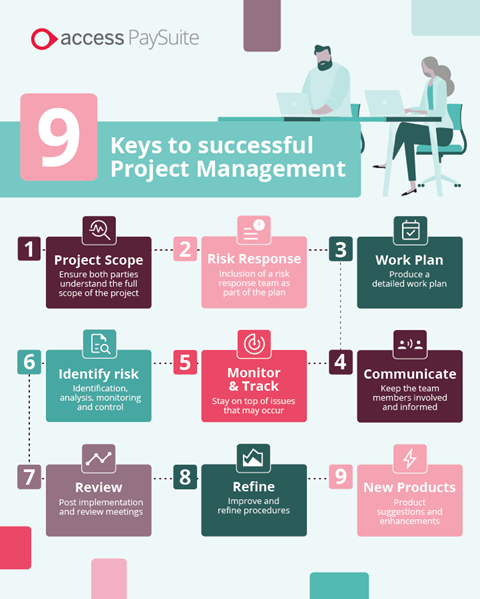When considering the implementation of new payment solutions, there are several key elements that need to be agreed upon between you and your payment services provider. These elements include:
Both you and your supplier need to establish a clear understanding of the objectives from the outset. It’s essential that all goals and objectives are communicated to stakeholders before the project is given the green light. These people must ideally include members from key sections of the organisation, specifically Strategic, Technical, Financial and Operational departments.
If there’s a mismatch in understanding the scope of a project between you and the project team, you’re almost certainly headed for trouble. In advance of project kick-off, ensure project deliverables, goals, and compliance with PCI standards are clear to everyone involved.
This is a back-up team whose primary job is to ensure that stakeholders are well taken care of and the client avoids risking their investment. A risk response team can be a project lifesaver, although their main function would be to take the worst-case scenarios into account and have a plan ready for them in advance.
It makes sense to have a risk response team in place, as life shows us that things can clearly go wrong, or unexpected incidents occur along the way.
Having a work plan is crucial to the success of a project. A detailed work plan serves as a starting point for everyone involved as it not only details tasks, but the demarcation of responsibilities between each of the parties involved. It’s an essential tool that allows project members to check off tasks and meet deadlines.
Generally, the plan would include all essential information, such as responsibilities, deadlines etc, and should be located at a centralised, easily accessible location for all to access.
In order to ensure smooth project execution and prevent any misunderstandings, it is crucial to communicate project requirements to everyone involved, rather than confining it to management. By keeping all team members in the loop regarding any changes, updates, and developments, you can foster a collaborative environment and promote effective teamwork.
It’s understandable that with so many tasks and other variables to take into account, it’s easy to lose track. Monitoring and tracking progress at regular intervals, provides an effective way to stay on top of issues that may occur.
Although risk identification should be part of project tracking and monitoring, it should have a place of its own while talking about the best practices of project management. The risk response team needs to have a clear methodology for risk management — from identification and verification, through analysis, monitoring and control.
Once the project has been completed, it’s vital to hold a post implementation review meeting to log successes and failures. It acts as a great opportunity to discuss what went well and perhaps not so well, but more importantly, how things can be improved and refined for future projects. A post implementation review meeting should not be held in isolation and should be followed by regular account review meetings to monitor up-time, transactional through-put and serve as a forum for new product suggestions and enhancements.
By addressing these key elements, you can ensure a successful implementation of new payment solutions, delivering them on time and within budget.

Don't wait any longer. Contact us now to embark on a journey towards seamless payments. Let Access PaySuite be your partner in transforming your business.

When running an online business, it is crucial to ensure a secure and reliable link between your paying customers and the bank. This is where a Payment Service Provider (PSP) plays a vital role. But how do you choose the right one for your business?
Read now
In this guide, we’re going to provide valuable insights into providing secure payment services and using fraud detection tools, helping your business to safeguard customer data and minimise financial risks.
Read now
Accepting ecommerce payments is vital for online businesses. To succeed, you'll need a dependable payment service provider (PSP) offering real-time payment solutions. Our guided covers the process and tips on how to start accepting payments online effectively.
Read now